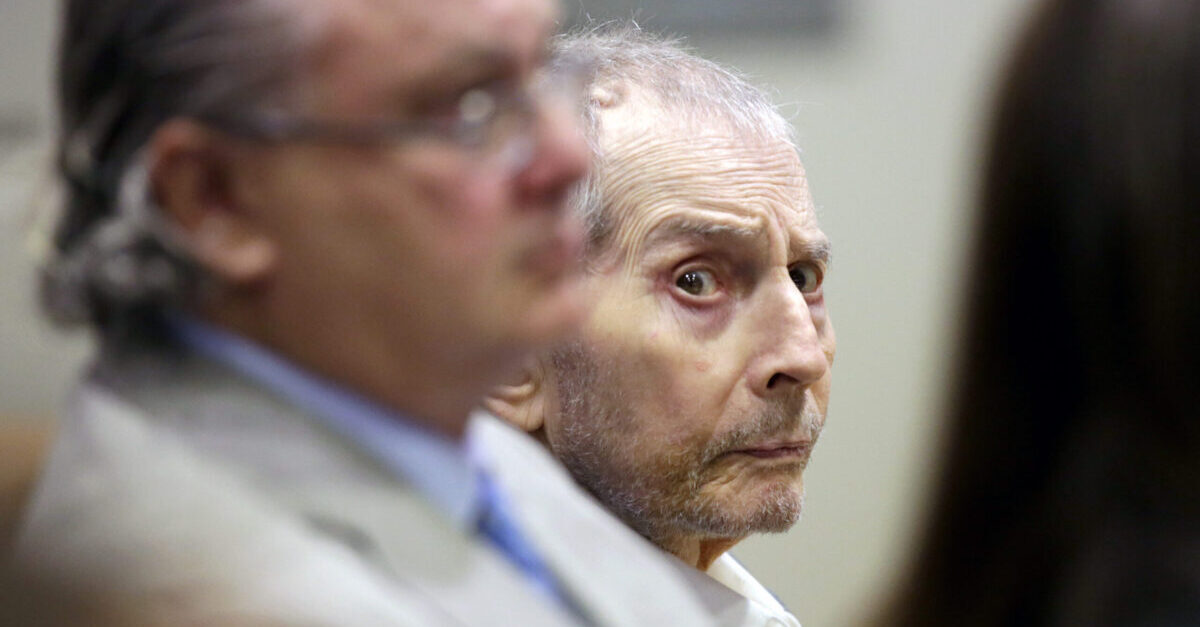
A California judge on Tuesday refused to grant yet another defense request for a mistrial in the murder case against wealthy real estate heir Robert Durst.
Proceedings in that case began during the first week of March but have been on hold since the second week of March on account of the novel coronavirus pandemic. Testimony was scheduled to resume July 27 with the same jury which heard the oftentimes superfluous opening statements and a handful of witnesses who testified before the pandemic struck. The July 27 date will remain intact, the judge ruled, but the case will be heard in a different courthouse.
But the judge, Mark E. Windham, also said he would examine on July 20 whether the trial should be adjourned due to continued concerns about COVID-19. Attorneys will be required to report to court that day or to provide specific documentation to explain why they are not present, the judge said.
Windham acknowledged that part of his job entailed protecting public health; he said he did not wish not put anyone’s health in jeopardy by resuming the proceedings. Nor would he interfere with the defendant’s right to counsel. He said the only motion in front of him right now was one for a mistrial, and that the legal standard for judging that motion was whether Durst’s chance of receiving a fair trial has been damaged. The defense moved to shut the case down in March, and the court did so; however, “it’s not a question of if, but when” the trial would resume, he said.
When the case resumes, the judge said he would allow each side to present a second round of opening statements with no audiovisual aids. Such arguments were necessary, the judge said, given the delay; however, they would be limited to one hour for each side.
Defense Attorney David Chesnoff unsuccessfully argued that picking a fresh jury would not be a burden. He argued that the legal presumption of judicial economy and efficiency — that is, not wasting court resources — cannot be used to deprive Durst a fair trial. He further argued that there was no legal reason to push forward with a trial that had suffered a delay of well more than three months using the same jury. Among the issues the defense feared was that the jurors who have in essence placed on hold for months could have used the long delay to look up or otherwise absorb the voluminous information already widely available about the case.
The prosecution and the court rubbished those concerns because the jury has been instructed, even during the delay, not to absorb media accounts of the case.
The defense further argued that forcing the trial to reconvene could expose witnesses, counsel, and jurors to COVID-19. Five of the jurors are over the age of 65, the defense noted, and three work in health care. Trials are busy affairs, and gathering everyone into a facility while still observing social distancing measures would be difficult from a legal and from a health perspective, the defense said.
Defense Attorney Dick DeGuerin, who is 79, has been told by his doctors he should not leave his home in Houston, Texas to return to California to try the Durst case, the defense said. The defense also worried that Durst, who is in declining health, could contract COVID-19 should he be taken out of isolation and shuttled back and forth to the courthouse.
The defense also said communication through masks would be difficult for witnesses, for attorneys (who frequently must whisper to one another), for Durst (who is hard of hearing and must communicate to his attorney during the trial), and for jurors tasked with ascertaining whether a witness is lying or telling the truth through a mask which covers his or her facial features. In short, social distancing and mask-wearing would result in myriad trial advocacy and constitutional issues surrounding attorney-client communications, the right to a fair trial, and the right to confront witnesses, the defense said.
Prosecutor John Lewin said Durst still could receive a fair trial. Witnesses could be recalled; testimony could be read back; and technology and social distancing measures could, in his view, be successfully applied. Lewin said he also found it odd that the defense was complaining that the jury wouldn’t remember the information that has thus far been presented — because most of it made Durst look guilty.
Lewin said that the defense has filed multiple motions for mistrials — at least five, he believed — and that Durst didn’t deserve his own special system of justice. Lewin said the constant attempts to delay the trial were “gamesmanship” by the defense.
Observers of the case have wondered if Durst–who is 77 and who has experienced a series of health problems including spinal surgery, an esophageal tumor, and a stent in his skull–would survive long enough to see the trial reach a verdict.
Lewin also said that it would be worse to put a pool of 400 or more jurors in a room together to go through voir dire than it would be to reconvene the jury already seated.
[photo by Alex Gallardo-Pool/Getty Images]
Have a tip we should know? [email protected]